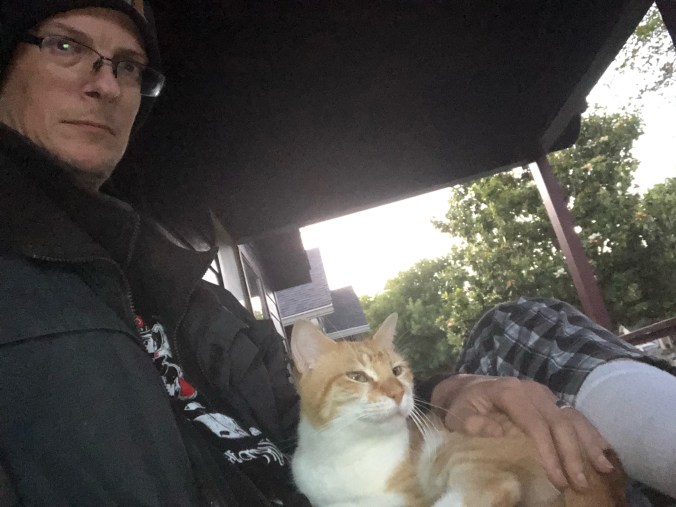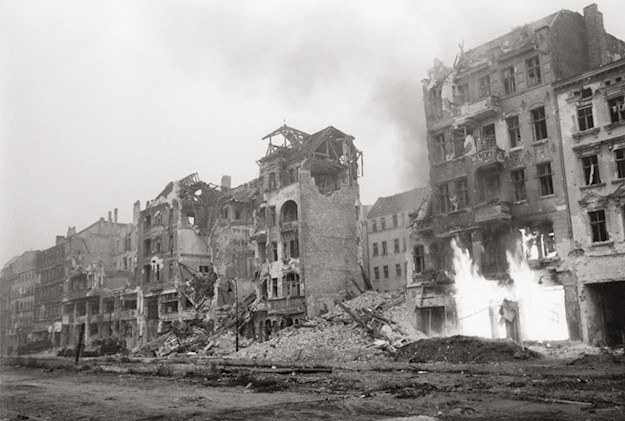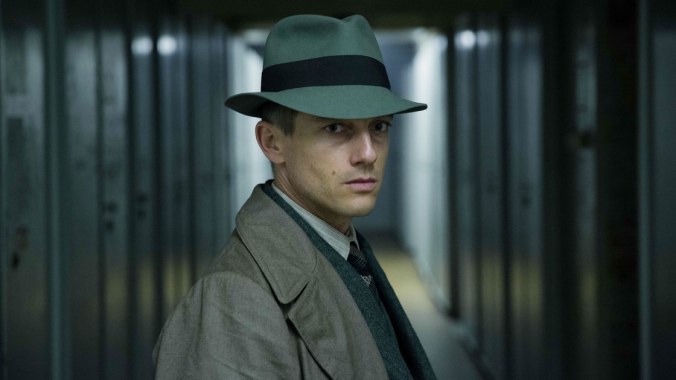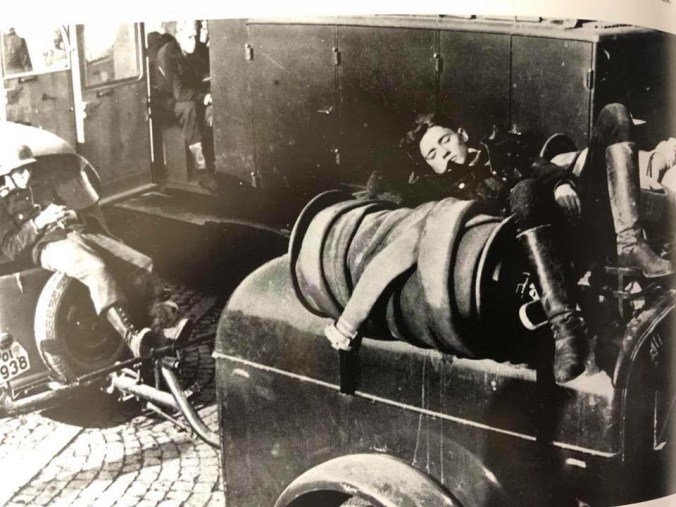
Tatiana looks quite pleased with herself.
May 8th
A bit of good news this morning. Actually, a lot of good news. We were able to secure the funds to rewire the house. 11K for a total rewire and a new breaker panel to bring the house up to current code. They will start work on May 18th. We can’t do it next week since it is final exams for me and so I need to have electricity and internet service to grade exams, enter final grades, etc. I think we’ll be dead before we are finished paying for all of the upgrades, but that is okay. It needed to be done. I’ll sleep better at night knowing that we’ll have a reduced risk of an electrical fire. We’ve been playing Russian Roulette with that for a while now, ironic, me being a retired fireman and all. So, if you are keeping track, that’ll be 25K in upgrades since this whole Rona thing began, not the virus has anything to do with it.
To mark the 75th Anniversary of VE Day, I’m having a Foyle’s War marathon.
May 9th
Though the Western Allies celebrate VE Day on May 8th, due to the time difference, the signing of the surrender wasn’t announced in Moscow until just after midnight on May 9th. Yuri Levitan, the official radio voice of the Soviet government, made the official statement which you can listen to here. Incidentally, he was also the individual who, at eleven am Moscow time on June 22, 1941, told the Soviet people of the German invasion. You can find that announcement here. His voice was so recognizable that Hitler declared that upon the capture of Moscow, Levitan would be the first person killed by the Germans. All of his news broadcasts opened with the words, “ГОВОРИТ МОСКВА” (‘Moscow speaks”).
Though I suppose that I should be watching some epic Russian World War Two (or Great Patriotic War, as they call it) dramas today, I am forging ahead with my Foyle’s War marathon since I have quite a few more episodes to go. Instead, I will give you some recommendations here! One of the more recent ones that I’ve seen is Ancestral Land. It is a sweeping family epic that begins in the pre-war period, but the viewer follows the fortunes (or misforunes) of the family through the war and into the post-war period. At times funny, at times tragic, it is a worthy successor to the epic Russian dramas which have come before it. It is free if you have an Amazon Prime account, but if you don’t, you can find it, with English subtitles, on YouTube here. The tale of the all-female Soviet fighter pilot squadron known as the Night Swallows was also made into a series. It is excellent. I also recommend The Attackers and Three Days in the Life of Lt. Kravstov. Check out the Star Media YouTube channel for lots of series, covering all sorts of subjects, with English subtitles.
If you prefer books to TV, the classic Russian novel to come out of World War Two is Life and Fate by Vasily Grossman. It is often called the Soviet War and Peace. That’s an accurate statement, as it is massive in scope with lots of characters to follow, just like Tolstoy’s masterpiece. When he originally submitted the book for publication, it was seen as so inflammatory by the Soviet government that the KGB raided his flat, seized the manuscript, his notes, and even the typewriter ribbons! Grossman was told that the book could not be published for two or three hundred years. However, it was published in English in 1960, but the first Russian language version wasn’t published until 1980. This is somewhat akin to Doctor Zhivago which, despite being written in Russian, was originally published in another language. Though the book is widely available on Amazon, etc, if you want a special quarantine treat, you can find the BBC radio play adaption of the novel on Audible here. Who doesn’t like a good radio drama, right?
I’m in a lot of pain this afternoon. My back is really unhappy. It is funny, really. There is so much damage in my lower spine that it is impossible to figure out why there is still so much pain, but it doesn’t matter, I guess, since there is nothing that they can do for me that hasn’t already been done. They can transplant hearts, lungs, and kidneys, but they really can’t do any more for a damaged spine than they could do a hundred and fifty years ago (other than fusion operations, which usually don’t have good outcomes). The benefit of having a damaged spine one hundred a fifty years ago is that you could order morphine through the mail, no questions asked. I don’t want to go on a rant here, but the problem with the government pushing the “opioid crisis” is that it doesn’t have an impact on illicit drug users. They don’t obtain their stuff legally anyway. So instead, the DEA and CDC go after legitimate patients. If you were to look at my MRIs, you’d see how remarkable it is that I can even get out of bed. The doctors have said as much. But I can’t get adequate pain control because of all the restrictions. That said, I do get some and I make do with what I have. Truthfully, I have to be able to function anyway, and so more medication would make that difficult. Still, it would be nice to not have days like this. On my best days, my pain level is a 4. My usual day to day pain level is a 6. That’s my normal. Days like this are up around an 8. It is difficult to describe the pain, other than it feels like someone is pounding me in the back with a sledgehammer while simultaneously zapping my legs with cattle prods and sticking an ice pick into my hips. Fun times, right? I’ll be laying on some ice packs here in couple of hours. That always helps some.
May 10th
I’ve had a lot of congestion in my chest due to allergies. Coughing is absolute murder on my back. The medication and ice helped yesterday, but I’m suffering today. Thankfully the coughing calmed down after I had been up for an hour or so. Due to my spine, I have to sleep flat on my back with a pillow under my knees. This means that overnight, all of the allergy gunk settles in my chest and getting out of bed in the morning triggers coughing spasms which then trigger back spasms. I’m assuming it is allergies, because they have been pretty bad of late, and not The Rona. I have no fever and don’t feel feverish. It is funny that with The Rona, allergy season has turned into the Salem Witch Trials. One cough and every stares at you. Or so I’ve been told. I’m avoiding going out in public.
This morning, virtual final exams opened. They’ll be closing at 11:59pm on Wednesday, May 13th and grades are due Friday, May 15th at noon. Final exam week, professors are usually bombarded with emails begging, demanding, cajoling, etc, a higher grade than what was earned and/or the opportunity to turn in an assignment that was due three months earlier. It is bad enough during a regular semester. This time, I’m expecting it to be REALLY bad, but we’ll see. Not to mention the fact that Blackboard, our online learning platform, is known to crash during periods of peak usage and now we have every single student taking every single final online. Most probably won’t log in to do them until Wednesday afternoon/evening. It’s a recipe for disaster, but there isn’t anything we can do about it. The important thing is, the semester is almost over. I’ll be glad to see it go. Lord knows what the fall will bring. Right now, the college is forging ahead with plans to have everything be business as usual in the fall. I’m not sure if that is wise or not. I think we should be making serious contingency plans.
May 11th
I got a decent night’s sleep last night. It may very well be due to the dose of Nyquil I took about thirty minutes before bedtime. Today, I had to do some grading and, of course, the emails have started trickling in from students who haven’t turned in a thing all semester but still somehow feel entitled to an A. Yesterday, I finished my Foyle’s War marathon. Today, I am watching Band of Brothers and last night I watched Battleground, which is one of my favorite World War Two movies of all time. I’m just ready for Thursday to get here so I can enter grades and put this whole semester behind me as quickly as possible. I’m pretty sure that everyone feels the same way. But I don’t know what things will look like moving forward. The jury is still out on what the fall semester will look like.
I’m working on giving up the cigarettes too. It isn’t going all that great. With the downtime caused by the quarantine, I’ve had eight weeks in which sitting on the front porch and having a smoke is the only time I get outside the house. (I don’t smoke inside the house). This might actually explain some of my lung congestion, now that I think about it. Quitting, I mean. Yesterday, I made it thought the day with only ten cigarettes, down from my usual 30 or so. That’s a step in the right direction. Today has been better. I’ve only had three and it is already 1 pm. So I’m getting there, and I will get there, it’ll just take time. It is funny, but several years ago, back in 2012, I quit for a year and a half. I just woke up one day and said I wasn’t going to do it anymore. Never had so much as a craving. I remember wondering why people said it was so hard to quit when I had done it so easily. Well, I’m finding that out now.
May 12th
Yesterday, I had an appointment for the electrician to stop by between noon and two to go over what we’ll need to do to get the house ready for the rewiring. He didn’t show up, but this morning I got a message from him on my cell phone saying that the office told him that I wanted him to call me. So maybe I just got confused with what the office told me. Regardless, I’ll call him back here in a little bit. It can easily be discussed over the phone instead of in person, so I’ll be able to get my questions answered. I do know that it is going to be a challenge for us given how small the house is and how full of furniture it is. Furthermore, I am unable to move any furniture owing to my damaged spine. We will probably have to have some help. A lot of help.
Tomorrow I have a task force meeting at ten. It is the task force on re-opening the college. This morning, I’ve looked over the draft plans for resuming normal operations and found some flaws, but I’m not sure what can be done about them. I’m afraid that we are planning for the best case scenario and ignoring the worst case scenarios. That’s the opposite of how it should be. We should be preparing for the worst case scenario and hoping for the best case scenario. I guess I’ll have to be the “bad guy” at the meeting and ask the uncomfortable questions that no one else wants to ask. (I have a bit of a reputation for doing that anyway). State entities like colleges are between a rock and a hard case with our governor acting like everything is fine, yet our daily case counts are the highest now that they’ve ever been. Maybe the pandemic will burn itself out this summer and we’ll be fine in the fall…for a while at least. People are predicting a second, potentially worse, wave in the fall. Who knows what will happen?
My allergies have been extreme today. I started sneezing immediately upon getting out of bed. Allergies have been bothering me all spring, around the same time this quarantine thing started. It is funny, but for the first 29 years of my life, allergies never bothered me. However, all that changed in 2007. I don’t know why/what happened to cause them to kick in, but they have. Every spring since then, I deal with sneezing, runny nose, occasional sore throat, and a dry cough. I loaded up on allergy medication this morning, and I’m doing a little better now. (10:30am)
This morning, I’m watching a British reality series called Churchill’s Agents: The New Recruits on Netflix. In the show, they take modern British volunteers and put them through the WW2 Special Operations Executive selection. For those who make it, they move on to the training portion. It is very interesting. Following the end of World War Two, my grandfather was part of the first contingent of Americans to arrive in Berlin. He stayed in Germany until early 1947 and was involved in Operation Paperclip. One day, a group of civilian men in uniforms visited him and offered him a civilian job to stay on in Berlin. He figured out that it was doing intelligence work for what would become the CIA. He said no, and they put him on a plane headed home the next day. At that point, he’d been overseas since 1942 and in the Army since 1940, and so it is understandable why he was ready to return to the States.
I talked over the game plan for repairs with the electrician by phone today. On Monday they are going to replace the panel. On Tuesday and Wednesday, they will re-wire the kitchen and living room. On Thursday and Friday, they will do the bedrooms and bathroom. We will be without power entirely on Monday while they do the panel but will get it back at night. After that, they will shut it off to the room they are working in but leave the rest running, so we will have some power during the repairs instead of being without power for the whole five days. That’s a definite plus. I now have a plan for how to move the furniture and where all to put it. As I said earlier though, the issue will be physically doing it since I cannot help at all and my wife can’t do it all by herself. We will manage though. I’m sure of it. It is five days of inconvenience and after that, we can sleep soundly knowing that the risk of fire is greatly diminished. (Not all the way diminished, since there is always a risk. But right now, our current electrical system is VERY risky.)
May 15th
I just realized that I skipped two days of entries, but I had the last day of final exams and I had to enter grades. Also, they start working on the rewire job on Monday, and power will be sporadic for most of next week, so I probably won’t post on Thursday and will post over that weekend instead. (They’ll be finished by then.)
Until next time, friends, take care of yourselves.
And each other.
L.H.






















